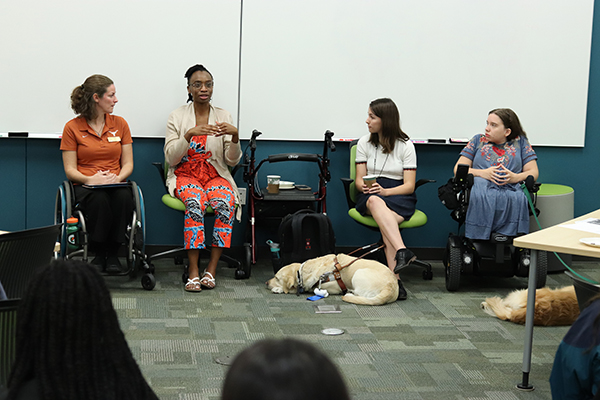The perpetuation of the idea that disabilities are always visible needs to change, said a UT employee said during an on-campus panel Thursday.
During the Disability as Diversity discussion, four panelists discussed reclaiming the word “disability” and shared their experiences with disabilities being taken seriously in school and the workplace.
Amie Jean, student body vice president and panelist, said she first got formally involved in the Disability Advocacy Student Coalition during her junior year. She said she related her experience of being disabled to her experience as a black student.
“(The coalition) has students who (understand) how to speak about their disability to professors and to professionals and just getting that experience with them was instrumental to (thinking that) I could do something that I wanted to do,” finance senior Jean said.
Coalition president Emeline LaKrout, who is blind, said she struggled during her first year at the University before her visual impairment was recognized. Marketing senior LaKrout said she brought her personal experiences to a leadership role as president.
A few dozen people attended the event, which was hosted by Services for Students with Disabilities and the Texas Center for Disability Studies. Emily Shryock, assistant director of Services for Students with Disabilities, said students and the University should realize that disability is not always displayed in expected ways, but all disabilities are still valid and should be acknowledged.
“We usually do a speaker series every October for Disability Awareness Month,” said Nichole Winges, an adjunct assistant professor at the Texas Center for Disability Studies. “To just kind of blow that up, we decided to have one event every month, a different place every time, and include people that have not been included before.”
Caroline Graves, the Student Government Disability and Inclusion Agency director, said she was the only physically impaired student at her high school. She said she hopes there will be more conversations confronting other peoples’ perspectives to create an inclusive environment.
“Coming to UT, I was able to interact with other people with disabilities for the first time, and that was really cool to see that advocacy element,” said Graves, a government and public relations senior. “It’s definitely been a journey with its ups and downs in terms of getting accommodations … but I’m really lucky that I’ve been able to find a community at UT.”





















